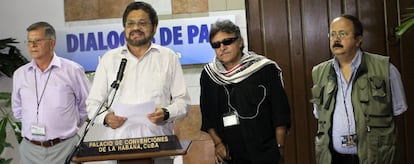End of conflict is near, says chief negotiator for FARC group
Havana peace talks have been underway for 11 days

“We have the certainty that Colombia is near the end of the conflict.” So said an optimistic Iván Márquez – the chief negotiator for the Colombian guerrilla group FARC at the Havana peace talks – during a lengthy interview with the radio station RCN on Monday.
The FARC’s number two explained that if they are sitting down at the same table with the government of Juan Manuel Santos, it is to find common ground to end a conflict that is half-a-century old already.
These statements come in the middle of a break in the current round of talks, which have been going on for 11 days, and are now focusing on the FARC’s participation in political life once its members are demobilized.
Márquez –whose real name is Luciano Marín Arango – said that “wars are not eternal,” and broached the thorny issue of how the group will turn in its weapons. The Colombian government has said that one of its conditions to let former FARC members participate in politics is to do so without any weapons in play. “Never again can politics and arms go hand-in-hand,” said Humberto de la Calle, the government’s chief negotiator.
Although the guerrilla leader declined to say what would happen to the weapons, he said they have analyzed cases such as that of the IRA in Northern Ireland, and stressed that this is a peace process, not a submission process.
Another issue that cropped up during negotiations was the FARC’s request to convene a Constitutional Assembly to confirm any agreements reached in Havana, a request that has been firmly rejected by the government so far.
But Márquez insisted that “the Constitutional (Assembly) must be the destination for a political agreement derived from the need to make institutional changes that will set the basis for peace,” making this institution the ideal mechanism for such purposes.
The guerrilla chief also mentioned the recent statements by General Attorney Eduardo Montealegre, who said that the FARC’s participation in politics is a long way off due to the alleged crimes against humanity committed by the guerrilla group. Márquez said that such statements are like “sticks in the wheels” of the peace process, and that the essential thing is the establishment of a transitional period toward what he called “a democratic regime” that includes everyone, and not just a demobilized insurgency.
The chief negotiator for the oldest guerrilla group in the Americas also talked about the victims, a central topic in any deal with the government. But he deflected any guilt by saying that “the victims are victims of the conflict,” adding that the state is also guilty either through action or omission, and that a committee must be appointed to assess the historical responsibility of all parties involved.
During the interview, Márquez also supported a hypothetical alliance with the Colombian left, as some congressmembers have suggested, but he did not provide any clues as to what party FARC members might end up with.
“We would like to see a convergence of leftist political forces, of progressive parties, of all the sectors that want peace,” he told RCN.
As for coming up with a timeline for the agreement – the government is trying to speed things up and get signatures down on paper by November – Márquez did not rule it out. “It is possible, it is possible. I dare not assert it. Peace needs all the time necessary to build it; a rushed peace, a botched peace, would be worse than a war.”
It remains to be seen whether his words materialize into concrete progress when the next round of talks begins on July 22.
Tu suscripción se está usando en otro dispositivo
¿Quieres añadir otro usuario a tu suscripción?
Si continúas leyendo en este dispositivo, no se podrá leer en el otro.
FlechaTu suscripción se está usando en otro dispositivo y solo puedes acceder a EL PAÍS desde un dispositivo a la vez.
Si quieres compartir tu cuenta, cambia tu suscripción a la modalidad Premium, así podrás añadir otro usuario. Cada uno accederá con su propia cuenta de email, lo que os permitirá personalizar vuestra experiencia en EL PAÍS.
¿Tienes una suscripción de empresa? Accede aquí para contratar más cuentas.
En el caso de no saber quién está usando tu cuenta, te recomendamos cambiar tu contraseña aquí.
Si decides continuar compartiendo tu cuenta, este mensaje se mostrará en tu dispositivo y en el de la otra persona que está usando tu cuenta de forma indefinida, afectando a tu experiencia de lectura. Puedes consultar aquí los términos y condiciones de la suscripción digital.








































